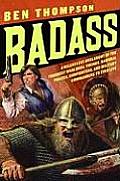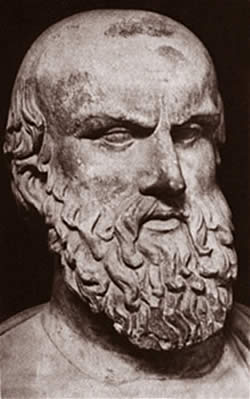Forward, sons of the Greeks,Liberate the fatherland,
Liberate your children, your women,
The altars of the gods of your fathers
And the graves of your forebearers:
Now is the fight for everything.
—Aeschylus, Persians
 When most people think about Classical Athens, three things come to mind — insane Greek tragedies so face-meltingly heart-wrenching that they make you want to violently fling yourself off of the next moderately tall object you encounter; totally sweet togas; and phalanxes of heavily armed hoplite warriors angrily punching their spears through the abdomens of people they don't particularly care for. In that sense, the Greek soldier/playwright Aeschylus was the quintessential Athenian, and the epitome of what it meant to stomp balls across the Mediterranean in the pursuit of freedom, justice, and top-notch theatrical performances.
When most people think about Classical Athens, three things come to mind — insane Greek tragedies so face-meltingly heart-wrenching that they make you want to violently fling yourself off of the next moderately tall object you encounter; totally sweet togas; and phalanxes of heavily armed hoplite warriors angrily punching their spears through the abdomens of people they don't particularly care for. In that sense, the Greek soldier/playwright Aeschylus was the quintessential Athenian, and the epitome of what it meant to stomp balls across the Mediterranean in the pursuit of freedom, justice, and top-notch theatrical performances.

Born in 525 BCE in a small village near Athens, things started out innocuously enough for young Aeschylus. He spent his formative years busting his ass working in a vineyard (which is pretty cool, I guess), until one day all of a sudden he was visited in a (perhaps alcohol-induced) dream by the Greek god Dionysus. You may remember Dionysus as the patron deity of booze, wine, orgies, grapes, partying, theater, ecstasy, and ritual madness, so it's probably pretty safe to say that this guy was like the John Blutarsky of Mount Olympus, and being visited by him back in the sixth century BCE was kind of like having Hugh Hefner bust in through your bedroom window on a zipline and personally invite you to a Halloween party at the Playboy mansion. Anyways, in this crazy hallucination Dionysus allegedly told Aeschylus to quit his crappy job and go write some damn plays, and when the young vintner awoke the next morning, he promptly gave his jerk boss the finger and went off to go drop some theater on peoples' asses.
As it turns out, this drastic career change worked out pretty well for our boy Aeschylus. Of course, this is a detail you can probably glean for yourself when you hear that he is now known as "the father of tragedy" and is considered to be one of the three greatest playwrights in the history of Ancient Greece. He was also the first guy to add multiple characters to a play and have them interact with each other, thereby paving the way for everything from William Shakespeare to Quentin Tarantino. So yeah, he was kind of a big deal.
Don't assume, however, that just because he was a theater mastermind Aeschylus wasn't a badass. If this guy were a real-life writer/director, he'd be like Clint Effing Eastwood, because while he won a lot of awards for his theatrical accomplishments, he could also beat the holy living crapstick out of you without even blinking. For instance, when the Persian Emperor Darius II got a total hard-on for destruction and decided he was going to single-handedly burn all of Greece into cinders with a blowtorch and urinate on the ashes, Aeschylus was one of the first guys to grab his sword, strap on a thick suit of bronze body armor, and tell the most powerful Emperor in the world to go sodomize a set of lawn furniture. The already-accomplished playwright was one of just 10,000 warriors who resolutely stood on the battlefield at Marathon in 490 BCE, just a few miles from Athens, and watched as an armada of 600 Persian landing craft unloaded a massive onslaught of nearly 200,000 pissed-off warriors on the shores of the Greek homeland. (For reference, this is roughly the same number of men who went ashore during the D-Day landings at Normandy in World War II.) Despite staring down a force 10 times their size, Aeschylus and the Greeks didn't flinch. Instead, they did the last thing the Persians expected — they polished off their bronze balls, screamed a few thousand insults, lowered their spears, and charged full-speed at the Persian soldiers as they exited their boats. In the insane, blood-soaked mayhem that followed, the Greeks killed 6,400 Persians, captured seven enemy ships, and send the invaders running back to their mamas, all while losing just 192 of their own soldiers. Aeschylus and his brother charged out into the surf in an effort to run down the fleeing Persian soldiers, and Aeschylus's brother actually had his hand cut off with an axe while hanging onto the side of a ship as it tried to sail away.
But that wasn't even the end of it. Ten years later, Darius's son Xerxes came back, trying to get some revenge for the bad manners the Greeks showed his father, and once again Aeschylus was there to show the Persians that standing in front of a phalanx is never a good idea. We all know about the brave stand at Thermopylae by Leonidas and his Spartans, but the real turning point of the campaign came in the naval Battle of Salamis. Taking place in the shadow of Athens once again, the Persians sailed 600 warships into the harbor to attack a Greek fleet of just 366 boats, seeking to crush the Greek navy forever and exert their dominance over their hated enemies once and for all. With the war hanging in the balance, Aeschylus and the Greeks fought for the very survival of their civilization, and once again snatched an improbable victory in the face of pants-soilingly-unfavorable odds. Two hundred Persian ships were destroyed, their navy was smashed, and Xerxes immediately hauled ass to the first place that didn't have pissed off hoplites desperately trying to shoot an arrow into his brain.
Having first-hand experience serving in two of the most epic battles Ancient Greece ever fought was pretty good for Aeschylus's career. He wrote a play about the Persians (cleverly titled The Persians) which won a bunch of awards and now serves as a primary source of historical information about the wars. His military attitude also compelled him to write a bunch of plays about the Trojan War and other sweet myths, and his works basically amounted to the Classical Age equivalent of badass war movies like Saving Private Ryan or something. Only seven of his works survive today, but he wrote over 80 of them and won countless awards across Greece. He took the first prize at the famed City Dionysia competition (think Cannes with togas) 13 times, shattering Euripides's record of five. He was also inducted into the Elusinian Mysteries, a badass insane cult dedicated to the worship of the goddess Demeter, and immediately used some of the material in one of his plays — a move that pissed people off so bad that they tried to kill him on the spot. He eventually left Athens after putting on a play where the costumes of the Furies were so frightening that people urinated on themselves and women miscarried their children, and went on the chill in Sicily for a while with the Tyrant of Syracuse (which I only mention because it's an awesome title). He died in 455 BCE when an eagle dropped a tortoise shell on his head, which is probably one of the most bizarre things I've ever heard.
Despite being the father of tragedy and one of the most revered playwrights in the history of Greek theater, Aeschylus was such a hardcore asskicker that he demanded his epitaph only mention his participation defending his homeland and his people from invasion on the shores of Marathon:
Euphorion's son and Athens' pride lays here;In fertile Gala's soil he found his rest;
His valor Marathon's wide plains declare;
As long-haired Persians who felt it can attest.
The blind Greek poet Homer was the Original Gangsta of epic shiz. In addition to bringing us the two greatest and most revered epic poems of all time — the Iliad and the Odyssey — this guy's life is made even more awesome by the fact that we really know absolutely nothing about the guy, down to the point where most historians can't even agree on whether he was a real person or not. If it helps, you can think of Homer as a badass literary ninja who showed up, wailed out a flaming lyre solo so face-melting that it was remembered for the rest of history, and then dropped a smoke bomb and back-flipped out of sight forever.
In addition to writing the earliest encyclopedia still surviving today, the Natural History, the Roman author Pliny the Elder was also a pretty badass military leader as well. At various points during his career as a highly-literate kicker of other peoples' asses, this high-born aristocrat led Rome's legions into battle in Germany, Spain, Africa, and Gaul, served as the high commander of all naval forces in the Bay of Naples, and somehow successfully avoided having his head lopped off by the Emperor Nero. He was eventually blown up in the name of science, dying when he inhaled too much volcanic ash while hauling ass towards Pompeii to investigate the eruption of Mount Vesuvius in 79 CE. I think we can all agree that this is pretty bitchin'.
When the Chinese military strategist Sun Tzu (author of The Art of War) put in an application to work for the King of Wu, the king decided to test Master Sun's skill by having him train a harem of 300 concubines in a couple of basic military maneuvers. Sun Tzu appointed the king's two favorite girlfriends to be company officers, and taught them the marching orders he wanted them to execute, but when Sun ordered the assembled babes to march, they did nothing. Sun promptly had the two company officers beheaded on the spot for failing to instill discipline in the troops. The next time Master Sun issued his orders the assembled soldiers snapped to attention and executed them perfectly. Sun Tzu got the job, but I wouldn't really recommend trying something like this on your next job interview.
For Further Reading:
The Persians by Aeschylus, Janet Lembke, and C. J. Herington
The Prometheus Bound of Aeschylus by Paul Elmer More
With Arrow, Sword and Spear: A History of Warfare in the Ancient World by Alfred S. Bradford
A Short History of Greek Literature by Jacqueline De Romilly
The Histories by Herodotus and G. C. Macaulay
Natural History by Pliny the Elder
Marathon 490 BC by Nicholas Sekunda
Warfare in the Classical World by John Warry